PUBLICATIONS
As our work progresses, publications are arising from our research themes and cross-cutting projects. We produce working papers, journal articles, evidence submissions to government enquiries, essays, books and book chapters. Subscribe to our newsletter to receive a monthly digest in your inbox. If you want to hear more frequently from us, you can subscribe to email updates from the website directly.

This paper shows that countries with robust health-related policy targets aimed at reducing non-communicable diseases (NCDs) experienced significantly lower mortality rates during the first year of the Covid-19 pandemic.

This commentary responds to a recent article purporting to identify ‘limits to degrowth’. This paper clarifies and sets in context the tensions between growth rates and decoupling rates on which the contested argument is based, disputing the claim that growth is the best way to achieve high rates of decoupling.

Modern economies rely on economic growth for stability and prosperity, but this dependence is ecologically unsustainable. Understanding growth dependency is crucial. We propose a sector-led framework to transform these reliances and disrupt their inevitability.
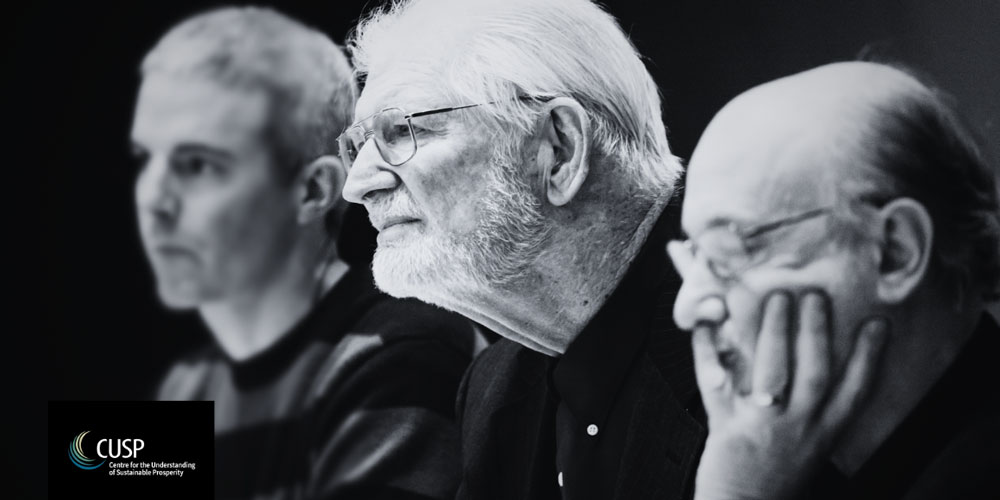
This commentary, by CUSP researcher Peter A. Victor in the latest C40 Cities journal, reflects on his extensive research of the late Herman Daly’s life and work. A concise summary tailored for policymakers.

Capitalism wields significant cultural influence, reinforced by the advertising industry and a scarcity of depictions of alternatives. Cities can counter this power by revising advertising policies to advocate for pro-social, pro-ecological lifestyles over mass consumption.

The paper explores energy justice narratives in popular culture, focusing on five Doctor Who episodes from the 1960s, 70s and 80s, highlighting the series’ limited critique of energy production and the class system. The show’s narratives of paternalistic rescue and technological progress remain highly relevant to current energy transition discussions.

This paper critically examines the potential effects of commercialising psychedelic substances. Drawing parallels with the well-established commercialisation of mindfulness, it discusses the societal tensions and ethical conflicts that may arise, focusing on concerns about distortion of original practices, co-optation reinforcing neoliberal principles, and cost-cutting alterations.

This viewpoint paper addresses the use of sustainability frameworks in embedding education for sustainability into the curriculum of Higher Education Institutions (HEIs), focusing on the paradox that sustainability frameworks must facilitate transformation of existing structures whilst also being well-enough aligned with current conditions to be readily adopted by today’s HEIs.

Inspired by a line dancing club in Stoke-on-Trent, and drawing principally on cultural theorist Raymond Williams, this article makes the case for appreciating the ways that cultural practices age and change over time.

This quantitative study of 4000 adults in the UK found that demographic factors only play a minimal role in explaining the likelihood of people being able to experience flow, suggesting that the rewards of flow may be available across society, irrespective of demographics.

This research provides the first assessment of the complex relationship between materialistic goal orientation and flow experiences in a shopping context. Our findings challenge the assumption that materialism impedes flow due to a lack of interest in, liking for, or goal alignment with flow-conducive activities. Rather, materialistic goals appear likely to undermine flow experiences due to factors that are consistent across activity types, such as trait levels of self-regulatory strength.
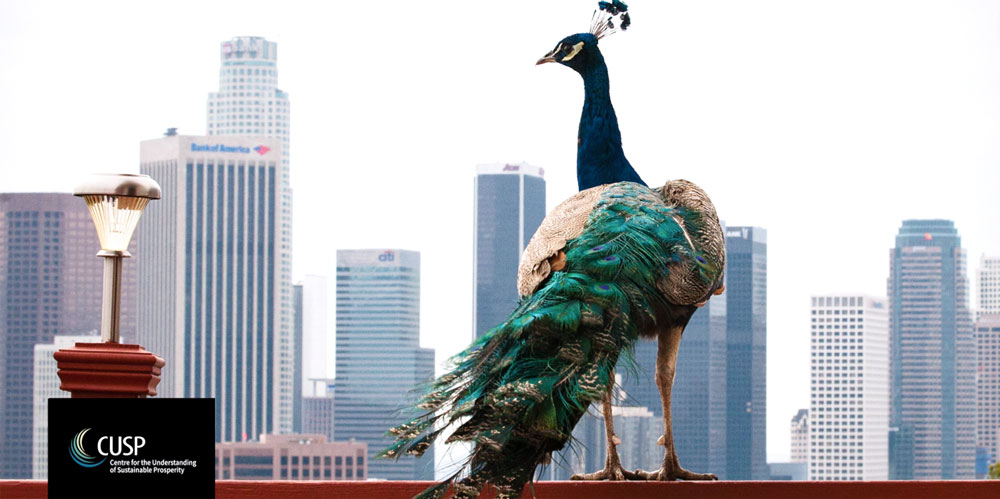
The sociology of consumption has had a fraught relationship with aesthetics, with varying levels of interest in the concept throughout the history of the discipline. Today, aesthetics is barely mentioned at all and is not considered to be relevant to enabling transitions towards more sustainable futures.

Climate activists are confronted with an increasing tension between the need for urgent climate action and a sense that it could already be too late to prevent ‘dangerous’ or ‘runaway’ climate change. This paper investigates the narrative shift, its impact on activism, and strategies that overcome its temporal contradictions.
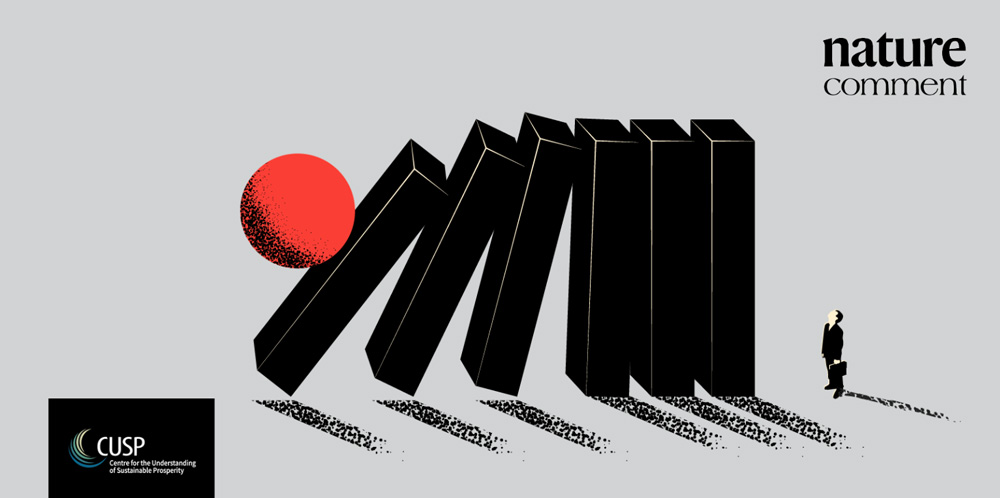
Wealthy countries can create prosperity while using less materials and energy if they abandon economic growth as an objective. This Nature comment piece is laying out the key challenges.

In recent years, much has been written on the role of different mental states and their potential to influence our way of thinking and the way we act. With the recent acceleration of environmental and mental health issues, alongside the limited effectiveness of existing interventions, an exploration of new approaches to deliver transformative change is required.

Stories about what living well means are critical both to the maintenance of existing ways of living and to the possibility of envisioning and transitioning toward fairer and more sustainable futures. The implications of the stories told on social media for the possibility of such futures have yet to be explored.

Given the need to a wider adoption to plant-based food consumption, our research sought to explore factors that influence consumers’ liking and willingness to pay for plant-based products. Boosting consumer wellbeing may be a means of encouraging the consumption of meat and dairy-free foods, our study finds.

SMEs play a key role in transitioning to net zero. Theresia Harrer and Robyn Owen explore why funding problems are so persistent for early-stage Cleantech ventures. An institutional logics lens is adopted to analyse how key actors’ perceptions and communications of the Cleantech value proposition shape information asymmetries, and how these may be overcome.

Secure housing is a fundamental human right. However, potential conflicts between housing and sustainability objectives remain under-researched. This paper explores the impact of current English government housing policy, and alternative housing strategies, on national carbon and biodiversity goals.

In this essay, CUSP researcher Simon Mair explores the ways that academic sustainability writing engages with economic systems and considers the performative effects of these modes of engagement. Through the lens of Capitalist Realism and Capitalocentrism, he defines three mechanisms by which non-capitalist futures are foreclosed.
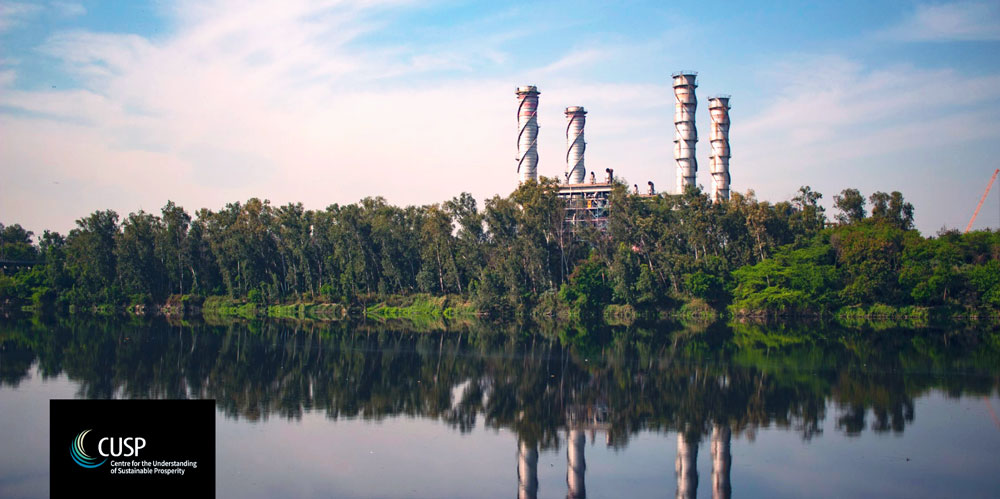
This paper presents a stock-flow consistent input–output integrated assessment model designed to explore the dual dynamics of transitioning to renewable energy while electrifying end use subject a carbon budget constraint. Unlike the majority of conventional integrated assessment model analyses, this paper does not assume the deployment of carbon dioxide removal and examines the role that alternative economic pathways (steady-states and degrowth) may play in achieving 1.5°C consistent emissions pathways.
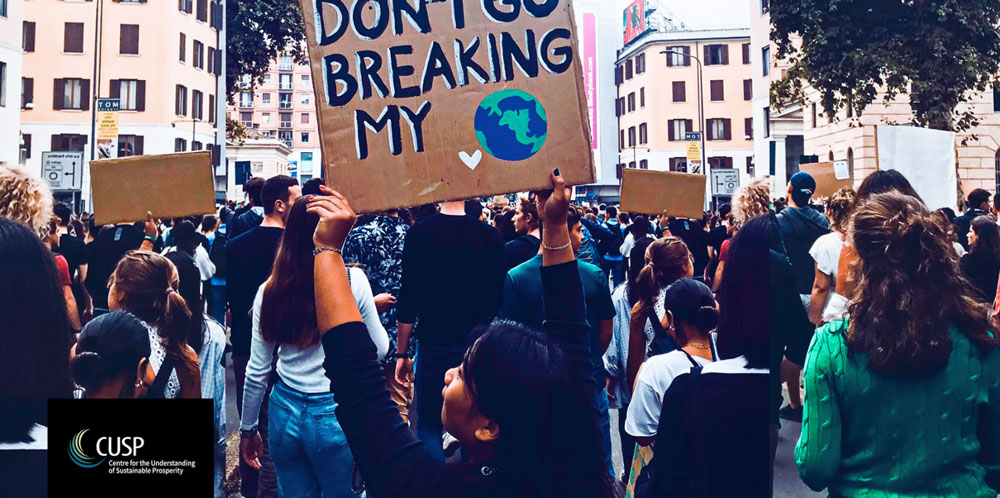
Tackling climate change cannot be achieved solely through technological breakthroughs or new climate models. We must build on the strong social science knowledge base and develop a more visible, responsive and interdisciplinary-oriented social science that engages with people and is valued in its diversity by decision-makers from government, industry, civil society and law.

Business models providing used clothing to consumers have the potential to reduce pressure on raw materials and primary production. This research used in-depth interviews and a literature review to improve understanding of alternative business models in the fashion sector.

This paper seeks to explore how professionals in the financial sector understand the challenge that climate change presents to economy and society. It is a case study into how ‘climate-related financial risk’ is understood in a particular area of expertise—within the actuarial profession.

This paper documents how materialistic value orientations have been linked to poorer wellbeing across different facets of wellbeing (personal, social, and environmental) and that these negative associations have been recorded across the lifespan.

Vast sums of public money are invested into universities globally as anchor institutions and knowledge bases providing seedbed resources for research and development and entrepreneurship. This paper examines two UK case studies of government support from the “Innovation Knowledge Centre” (IKC) program to translate research into industry innovation for public good.

Long-term care systems across countries within the OECD have undergone a progressive marketisation and financialisation in recent decades. In this Personal View, we argue that the accomapnying neoliberal market values make poor guiding principles for the care sector, identifying the dysfunctional dynamics that arise as a result, and reflecting on the clinical implications of each, with a focus on facility-based care.

Strong materialistic values help to maintain consumer capitalism, but they can have negative consequences for individual well-being, for social equity and for environmental sustainability. In this paper, we add to the existing literature on the adverse consequences of materialistic values by highlighting their negative association with engagement in attitudes and actions that support the achievement of sustainable well-being.

Critically evaluating existing literature, this paper discusses the potential of tripartite partnerships (TPPs) to advance sustainable consumption practices. The authors argue that multi-sector partnership approaches can strengthen a socio-political basis for the advancement of public policies and inter-sectorial dynamics offering mechanisms that can foster sustainable consumption.

How do Business Accelerators and Business Angels’ assess the human capital of socio-environmental mission led entrepreneurs? This paper investigates the role of entrepreneurs’ human capital on the potential of newly created ventures to receive equity funding from Accelerators and Business Angels using a resource-based approach to entrepreneurship theory.

Building on a longitudinal interview-based study, the authors examine how micro, small and medium enterprises (MSMEs) in the UK fashion industry advance the circular economy (CE).

Calls for social innovation to help with the effort to halt biodiversity loss are manifold. Yet, a systematic overview of research on social innovation and biodiversity is missing and this paper contributes by focusing on social innovation to tackle the drivers of biodiversity loss and unsustainability.

In this article, Amy Isham and Tim Jackson explore the dynamics of a psychological state known as flow. By synthesising the results of a series of experience sampling, survey, and experimental studies, we identify optimal activities that are shown to have low environmental costs and high levels of human wellbeing.

The clothing industry is a significant contributor to environmental degradation. Yet, easily accessible life cycle inventory (LCI) data that can be used in decision making by practitioners and researchers are lacking. This study addresses this gap.

New study examining the fashion design process as practised at the mass-market level. The mass-market design process is found to prioritise profits rather than aesthetic aspects, with the buyer exercising more power than the designer. This hinders creativity, which, in turn, may impede a move towards more environmentally benign designs.

A growing body of research demonstrates that wellbeing is positively correlated with ecologically sustainable behaviours, yet there is still much to understand about the nature of this association. This study suggest that pro-environmental behaviours are not only compatible with wellbeing due to a virtuous sense of “doing good,” but they may be inherently pleasurable.
